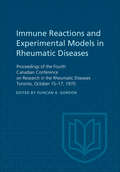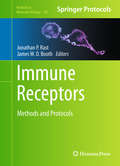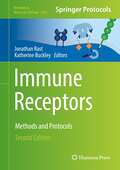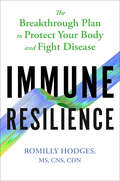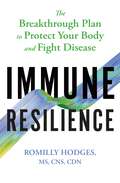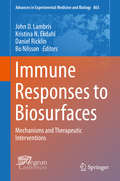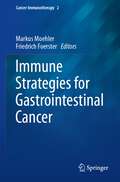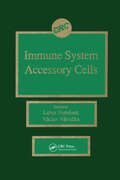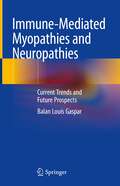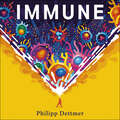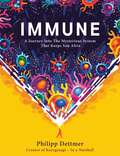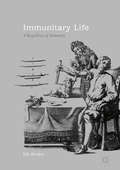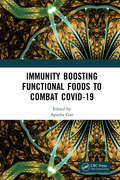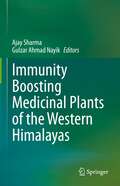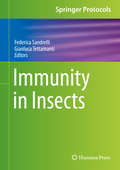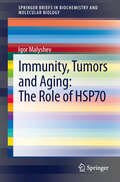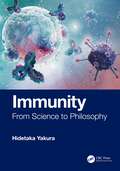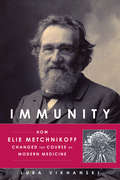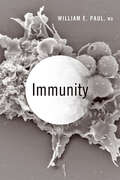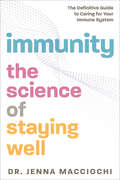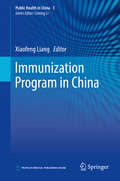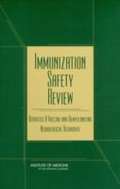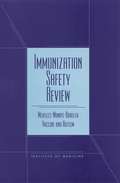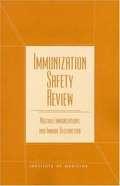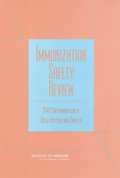- Table View
- List View
Immune Reactions and Experimental Models in Rheumatic Diseases: Proceedings of the Fourth Canadian Conference on Research in the Rheumatic Diseases Toronto, October 15-17, 1970
by Duncan A. GordonThe proceedings of the fourth Canadian conference on research in the rheumatic diseases held in Toronto in October 1970, this volume includes some 50 papers based on recent research carried out in Canada, the US, and abroad. The papers centre on two main themes: immunological aspects of the rheumatic diseases, and animal and experimental model diseases which have certain features in common with human rheumatic disorders.
Immune Receptors
by James W.D. Booth Jonathan P. RastImmunology has made significant progress in the past decade, driven forward by rapidly advancing technology and a renewed interest in the vast realm of innate immunity. The receptors that mediate these functions are at the front lines of both protective and regulative roles of the immune system. In Immune Receptors: Methods and Protocols, expert researchers present a variety of experimental approaches to the characterization of immune receptors and the cell biology that mediates their functions. These include imaging techniques that aim to understand receptor localization and trafficking, techniques to measure receptor-ligand interactions, strategies to identify novel ligands and methods to analyze downstream receptor signaling, as well as strategies for genomic and proteomic characterization of receptor repertoires. Written in the highly successful Methods in Molecular BiologyTM series format, chapters include introductions to their respective subjects, lists of the necessary materials and reagents, step-by-step, readily reproducible laboratory protocols, and tips on troubleshooting and avoiding known pitfalls. Authoritative and practical, Immune Receptors: Methods and Protocols offers technical descriptions and protocols that will be useful both to investigators who are interested in carrying out these procedures and to those who seek a deeper understanding of the bench science that lies behind the immunology literature.
Immune Receptors: Methods and Protocols (Methods in Molecular Biology #2421)
by Jonathan Rast Katherine BuckleyThis volume explores immune cell receptors that are used in the detection of microbes, either by binding directly to non-self molecules or through indirectly sensing microbe-associated cellular disturbances. The chapters in this book cover methods for studying receptor-ligand interactions at both molecular and cellular levels; methods to create and characterize novel antibody reagents; and methods to characterize the molecular processes that lead to adaptive receptor maturation. This book also contains chapters that look at high-throughput strategies that describe the diversity of immune receptors and cells. Written in the highly successful Methods in Molecular Biology series format, chapters include introductions to their respective topics, lists of the necessary materials and reagents, step-by-step, readily reproducible laboratory protocols, and tips on troubleshooting and avoiding known pitfalls.Cutting-edge and authoritative, Immune Receptors: Methods and Protocols, Second Edition is a valuable resource for scientists and researchers interested in learning more about this developing field.
Immune Resilience: The Breakthrough Plan to Protect Your Body and Fight Disease
by Romilly HodgesA sweeping look at the complexity of our immune system, with a natural, science-based program to help protect against viruses and other pathogens.Some people can fight off infections relatively easily, with minor symptoms, while others suffer severely. But these outcomes—and our immune responses against them—aren&’t fixed; we can build immune resilience. But how? The answer goes beyond popping vitamin C and zinc during flu season. As clinical nutritionist Romilly Hodges reveals, our immune system is intricate and multifaceted, and powerfully impacted by what we eat, as well as by our lifestyle routines. Immune Resilience offers a fascinating tour of the incredible ways our bodies protect us against disease, with assessments throughout to help the reader identify their weak areas. Then it outlines a personalized, step-by-step program blending defense-building foods with lifestyle strategies, including important advice on movement, sleep, and stress-relief. This book explains: • the connection between sleep and immune memory • how you can harness the power of gentle fasting • why good germs increase immunity and decrease allergies and asthma • how to prepare nutrient-packed meals, with recipes • what kind of exercise boosts immunity, and more With easy-to-reference guidelines for specific infections and a curated guide to the supplements you really need, this essential book helps you put your health in your own hands.
Immune Resilience: The Breakthrough Plan to Protect Your Body and Fight Disease
by Romilly HodgesYour ability to fight off infections and viruses is determined by your immune system. It may be that you fall ill more frequently than those around you. But this is not something you just have to live with - your immune resilience can be improved.Clinical nutritionist Romilly Hodges offers science-based nutritional and lifestyle advice on how to build your immune resilience.Exploring how our bodies protect us from disease, Immune Resilience will allow you to identify ways you can build your body's defences. A personalised programme covering diet, lifestyle and stress will help you achieve this. Did you know that sleep is connected to immune memory? And that good germs increase your immunity? You can even undertake exercises that boost immunity.With healthy recipes, a supplements guide and information on specific infections, Immune Resilience allows you to take control of your health.
Immune Responses to Biosurfaces
by John D. Lambris Daniel Ricklin Kristina N. Ekdahl Bo NilssonThe collection of chapters in this proceedings volume brings together research from academic and industry scientists and clinical development experts who are focused on contemporary and emerging aspects of improving treatments employing biosurfaces. Interactions between biomaterial implants, devices, cell therapies, and whole organ transplants frequently trigger activation of body defense systems and responses that negatively affect the clinical outcome. Optimal tissue integration and modulation of foreign body reactions is therefore essential for preserving anticipated functions and avoiding adverse effects. Topics covered include mechanistic and applied research within the fields of extracorporeal devices, soft and hard tissue implants, tissue and biomaterial-targeting, therapeutic modulation of foreign body reactions, cell encapsulations, as well as cell and whole organ transplantation.
Immune Strategies for Gastrointestinal Cancer (Cancer Immunotherapy #2)
by Markus Moehler Friedrich FoersterThis book provides an overview of the available evidence surrounding immunotherapy in gastrointestinal cancers, and discusses its future place in clinical practice.Immunotherapy has celebrated some astonishing therapeutic successes in a variety of cancer types and is becoming increasingly relevant in daily clinical practice. Currently, the predominant class of immunotherapeutic drugs is the so-called checkpoint inhibitors, which disengage the physiological brakes on the immune system, enabling a more effective anti-cancer immune response. Malignancies of the gastrointestinal tract, which account for the majority of cancer cases worldwide, are a major cause of morbidity and mortality, creating an urgent need for more effective therapies. A large number of clinical trials have evaluated the efficacy of cancer immunotherapy in gastrointestinal malignancies and demonstrated its potential in certain subsets of patients. This book will appeal to a wide readership, including oncologists, health care professionals in general and biomedical scientists.
Immune System Accessory Cells
by Vaclav Vetvicka Lubor FornusekImmune System Accessory Cells provides a comprehensive survey of all types of antigen-presenting and accessory cells. Macrophages are emphasized through descriptions of different types of endocytosis, other major properties, and all basic and new information concerning macrophages as antigen-presenting cells. Other topics covered include the impact of the immunodeficient state on accessory functions, the evolutionary emergence of accessory functions, and the role of various cell types in defense reactions in major assemblages of Metazoa. The book also presents a chapter describing the phylogenetic aspects of accessory functions, which traces the first accessory cells during the evolution of living matter.Immune System Accessory Cells is an excellent reference for immunologists, cell biologists, and others interested in developing an understanding of the roles of accessory cells in all facets of immune reactions.
Immune-Mediated Myopathies and Neuropathies: Current Trends and Future Prospects
by Balan Louis GasparThe book covers all aspects of immune-mediated diseases of the muscle and nerve, which are a group of complex diseases, whose diagnosis needs a team of specialists in the field of neuropathology, immunopathology, neurology, and rheumatology. Nerve and muscle biopsy evaluation is invaluable in distinguishing immune-mediated from etiologies and therefore, despite being invasive, pathological evaluation of nerve and muscle has stood the test of time. Chapters cover all the essential aspects of each disease entity viz. the pathogenesis, clinical features, diagnostic armamentarium, and guidelines for diagnosis and management. It is supplemented with full-colorful illustrations and photomicrographs for better comprehension. It includes a chapter highlighting the current progress in the field of immune-mediated myopathies and neuropathies as it is a rapidly evolving field with the addition of many new entities.This clinically oriented book serves as a primer for general histopathologists as well as a practice guide for neuropathologists. It is also relevant for neurologists and rheumatologists and encourages young medical students, residents, and research scholars in the field of neuropathology, neurology, and rheumatology to get involved in active research.
Immune: The new book from Kurzgesagt - a deep dive into the immune system
by Philipp DettmerA deep dive into the immune system that will forever change how you think about your body - how it works and why it is both your greatest ally and most dangerous enemy - from the creator of the popular science YouTube channel Kurzgesagt - In a Nutshell.'A truly brilliant introduction to the human body's vast system for fighting infections and other threats'JOHN GREEN, #1 New York Times bestselling author of The Fault in Our Stars'Reads as if it's a riveting sci-fi novel . . . a delightful treat for the curious'TIM URBAN, creator of Wait But Why**************You wake up and feel a tickle in your throat. Your head hurts. You're mildly annoyed as you get the kids ready for school and dress for work yourself. Meanwhile, an utterly epic war is being fought, just below your skin. Millions are fighting and dying for you to be able to complain as you drink your cup of tea and head out the door.So what, exactly, IS your immune system?Second only to the human brain in its complexity, it is one of the oldest and most critical facets of life on Earth. Without it, you would die within days. In Immune, Philipp Dettmer, the brains behind the most popular science channel on YouTube, takes listeners on a journey through the fortress of the human body and its defences. There is a constant battle of staggering scale raging within us, full of stories of invasion, strategy, defeat, and noble self-sacrifice. In fact, in the time you've been listening to this, your immune system has probably identified and eradicated a cancer cell that started to grow in your body.Each chapter delves deeply into an element of the immune system, including defences like antibodies and inflammation as well as threats like viruses, bacteria, allergies and cancer, as Dettmer reveals why boosting your immune system is actually nonsense, how parasites sneak their way past your body's defences, how viruses - including the coronavirus - work, and what goes on in your wounds when you cut yourself.Enlivened by immersive descriptions, Immune turns one of the most intricate, interconnected, and confusing subjects - immunology - into a gripping adventure through an astonishing alien landscape.Challenging what you know and think about your own body and how it defends you against all sorts of maladies and how it might also eventually be your own downfall, Immune is a vital and remarkably fun crash course in what is arguably, and increasingly, the most important system in the body.(P) 2021 Hodder & Stoughton Limited
Immune: The new book from Kurzgesagt - a gorgeously illustrated deep dive into the immune system
by Philipp Dettmer__________Pre-order now: The first book from the creator of the wildly popular science YouTube channel, Kurzgesagt - In a Nutshell, a gorgeously illustrated deep dive into the immune system that will change how you think about your body forever. 'A truly brilliant introduction to the human body's vast system for fighting infections and other threats'JOHN GREEN, #1 New York Times bestselling author of The Fault in Our Stars'Reads as if it's a riveting sci-fi novel . . . a delightful treat for the curious'TIM URBAN, creator of Wait But Why__________You wake up and feel a tickle in your throat. Your head hurts. You're mildly annoyed as you get the kids ready for school and dress for work yourself. Meanwhile, an utterly epic war is being fought, just below your skin. Millions are fighting and dying for you to be able to complain as you drink your cup of tea and head out the door.So what, exactly, IS your immune system?Second only to the human brain in its complexity, it is one of the oldest and most critical facets of life on Earth. Without it, you would die within days. In Immune, Philipp Dettmer, the brains behind the most popular science channel on YouTube, takes readers on a journey through the fortress of the human body and its defences. There is a constant battle of staggering scale raging within us, full of stories of invasion, strategy, defeat, and noble self-sacrifice. In fact, in the time you've been reading this, your immune system has probably identified and eradicated a cancer cell that started to grow in your body.Each chapter delves deeply into an element of the immune system, including defences like antibodies and inflammation as well as threats like viruses, bacteria, allergies and cancer, as Dettmer reveals why boosting your immune system is actually nonsense, how parasites sneak their way past your body's defences, how viruses - including the coronavirus - work, and what goes on in your wounds when you cut yourself.Enlivened by engaging full-colour graphics and immersive descriptions, Immune turns one of the most intricate, interconnected, and confusing subjects - immunology - into a gripping adventure through an astonishing alien landscape.Challenging what you know and think about your own body and how it defends you against all sorts of maladies and how it might also eventually be your own downfall, Immune is a vital and remarkably fun crash course in what is arguably, and increasingly, the most important system in the body.__________
Immunitary Life: A Biopolitics of Immunity
by Nik BrownThis book explores the growing intellectual interest in the politics of immunity. It argues that taking an ‘immunitary perspective’ is necessary if we are to better appreciate the body as a site of politics in the contemporary age. It explores the dynamic tensions between community and immunity, belonging and fragmentation, the social and the individual. It creates a dialogue between the social sciences, humanities and biopolitical philosophy around immunity. Immunitary Life empirically situates immunitary politics in real-world debates. This includes blood donation and evolving notions of embodied intimacy in the worlds of transplantation. It examines changing ideas about infectivity, bugs, and the emergence of ‘resistance’ in antibiotics. The politics of vaccination offers a classic context for thinking about the ever changing relationships between the communal and the individual. Immunitary Life is essential reading for contemporary scholarship in the sociology of the body and the political philosophy of biomedicine.
Immunity Boosting Functional Foods to Combat COVID-19
by Apurba GiriIn this book, several functional foods or food ingredients, their mechanism of immune enhancing properties and use in food products have been discussed through seventeen chapters written by eminent authors. There are several medicinal plants which have significant role for immunity boosting such as Ashwagandha, Tulsi, Shatavari, Giloy, Aloe vera, Amla, Neem, licorice, garlic, ginger, turmeric, rosemary, black cumin, cinnamon, sage, thyme,fenugreek, peppermint, black pepper, clove etc. These have been discussed in detail.Note: T&F does not sell or distribute the hardback in India, Pakistan, Nepal, Bhutan, Bangladesh and Sri Lanka.
Immunity Boosting Medicinal Plants of the Western Himalayas
by Ajay Sharma Gulzar Ahmad NayikThis book presents a comprehensive guide to traditional immunity-boosting medicinal plants of the Himalayas, their traditional uses, phytochemistry, pharmacology, diversity, conversation, biotechnology, toxicology, as well as future prospective. All the chapters cover the latest advances in ethnobotany, phytochemistry, biochemistry, and biotechnology. The book offers a valuable asset for researchers and graduate students of chemistry, botany, biotechnology, microbiology, and the pharmaceutical sciences. The main purpose of the present book is to draw on the rich culture, folklore, and biodiversity of immunity-boosting medicinal plants of the Western Himalayas, with particular emphasis on the Indian Trans-Himalayan and Western Himalayan region. All the plants included in the present book are extensively used by the local tribes and people for their health-promoting properties from ancient times. This book will be a substantial contribution to the knowledge of the region and the country. Also, the book will be very useful to scientists, graduates, and undergraduates, along with researchers in the fields of natural products, herbal medicines, ethnobotany, pharmacology, chemistry, and biology. Further, it is an equally significant resource for a person working in different traditional medicinal systems; doctors (especially those engaged in Ayurveda, Chinese traditional medicinal system, Amchi, and allopathy); the pharmaceutical industry (for drug design and synthesis); biochemistry and biotechnology sciences; and the agricultural sciences.
Immunity in Insects (Springer Protocols Handbooks)
by Federica Sandrelli Gianluca TettamantiThis volume details methods and protocols necessary to further the study of insect immunity. Chapters guide readers through up-to-date genomic and transcriptomic approaches, insect samples for proteomic analysis, hemocytes in Drosophila, cellular response in Lepidoptera, insect AMPs, manipulate the composition of mosquito microbiota, viral infections in insects, infections by entomopathogenic nematodes, immune response following oral infections, and protocols to to monitor the effect of septic infections with human pathogens using B. mori as a model. Written in the highly successful Methods in Molecular Biology series format, chapters include introductions to their respective topics, lists of the necessary materials and reagents, step-by-step, readily reproducible laboratory protocols, and tips on troubleshooting and avoiding known pitfalls. Authoritative and cutting-edge, Immunity in Insects aims to ensure successful results in the further study of this vital field.
Immunity, Tumors and Aging: The Role of HSP70
by Igor MalyshevThe book is dedicated to the topical area of biology and medicine and the role of stress proteins HSP70 in the regulation of intracellular protein homeostasis, signaling transduction and cell protection. The book is divided into chapters, which describe the discovery of HSP70 and its molecular structure, the mechanism of the synthesis and function in normal and damaged cells, examine the role of HSP70 in immunity, cancerogenesis, aging, Alzheimer's disease and cardiac surgery. In this book, the author looks at HSP70 as a factor which prevents the transformation of homeostasis mechanisms of intracellular proteins into a link in the pathogenesis of a disease.
Immunity: From Science to Philosophy
by Hidetaka YakuraThis book explores the essence of immunity. After an initial review of hypotheses, models, and theories proposed to explain immune phenomena in humans and mice, it summarizes the results from synchronic organism‑level analyses and diachronic analyses tracing phylogeny. These results suggest that immunity is coextensive with life and is equipped with functions similar to the nervous system. Philosophical reflection with reference to Spinoza and Canguilhem suggests immunity is part of the essence of life—and the essence of immunity embraces mental elements with normativity. Approaching the essence of any phenomenon in this way is called "metaphysicalization of science." This book demonstrates the potential of this approach and contributes to a richer understanding of nature.Key Features Reviews the history of immunological theories Discusses and integrates science and philosophy Provides a biological framework for cognition and self vs. nonself Inspired by Auguste Comte’s "The Law of Three Stages"
Immunity: How Elie Metchnikoff Changed the Course of Modern Medicine
by Luba VikhanskiAround Christmas of 1882, while peering through a microscope at starfish larvae in which he had inserted tiny thorns, Russian zoologist Elie Metchnikoff had a brilliant insight: what if the mobile cells he saw gathering around the thorns were the same as white blood cells that traveled to the site of an injury or infection in a human or other animal? Was this some form of cellular defense? Metchnikoff's theory of immunity, that phagocytes--white blood cells--formed the first line of defense against invading bacteria would eventually earn the scientist the unofficial moniker "Father of Natural Immunity" and a Nobel Prize. But first, he had to convince his colleagues, including the skeptical Robert Koch. Author Luba Vikhanski chronicles Metchnikoff's remarkable life, work, and discoveries in Immunity, the first modern biography of this hero of medicine. Metchnikoff was a towering figure in the scientific community of the early 20th century, a tireless humanitarian who worked to curb cholera, syphilis, and other diseases, and pioneered research into probiotics and gerontology. Though Metchnikoff is largely forgotten today, Vikhanski makes a compelling case that his work on natural immunity is finally receiving the attention it deserves.
Immunity: Innate Immunity (Advances In Experimental Medicine And Biology Ser. #560)
by William E. PaulA leading figure in immunology takes readers inside the remarkably powerful human immune system.Winner of the CHOICE Outstanding Academic Title of the Choice ACRLThe immune system has incredible power to protect us from the ravages of infection. Boosted by vaccines, it can protect us from diseases such as measles. However, the power of the immune system is a double-edged sword: an overactive immune system can wreak havoc, destroying normal tissue and causing diseases such as type I diabetes, rheumatoid arthritis, and multiple sclerosis. The consequences of an impaired immune system, on the other hand, are all too evident in the agonies of AIDS.Packed with illustrations, stories from Dr. William E. Paul’s distinguished career, and fascinating accounts of scientific discovery, Immunity presents the three laws of the human immune system—universality, tolerance, and appropriateness—and explains how the system both protects and harms us. From the tale of how smallpox was overcome and the lessons of the Ebola epidemic to the hope that the immune system can be used to treat or prevent cancer, Dr. Paul argues that we must take advantage of cutting-edge technologies and promising new tools in immunological research.
Immunity: The Science of Staying Well—The Definitive Guide to Caring for Your Immune System
by Dr. Jenna Macciochi“A highly accessible resource for those interested in ways to improve their overall health by improving the health of their immune system.” —ChoiceThe immune system is your constant guardian, fighting around the clock to protect you from disease. There’s a lot you can do to strengthen this first line of defense against all kinds of threats, from COVID-19 to cancer. In this book, immunologist Dr. Jenna Macciochi gives us a crash course on how the immune system actually works—and how to keep yours in shape—with authoritative guidance on: ·the best foods to eat to strengthen your immune system ·the importance of movement, and how often to exercise ·the essential link between immunity and sleep ·the immune system’s surprising connection to your mental health, and more
Immunization Program in China (Public Health in China #3)
by Xiaofeng LiangThis book aims to describe the achievements, policy and system of immunization management in China during the last 60 years. Immunization is one of the most effective and cost-effective means to prevent infectious diseases. The Chinese government has long attached great importance to immunization, and with several generations of effort, China has made great achievements through its immunization program.The book consists of 9 chapters, including the introduction of vaccination and immunization policy, immunization services, innovative vaccines, immunization activities in China. The book also demonstrates some of the hardships and difficulties behind the immunization achievements, and introduces the effort of Expanded Program of Immunization (EPI) staff and the support and assistance from the international community.
Immunization Safety Review: Hepatitis B Vaccine And Demyelinating Neurological Disorders
by Immunization Safety Review CommitteeThe National Academies Press (NAP)--publisher for the National Academies--publishes more than 200 books a year offering the most authoritative views, definitive information, and groundbreaking recommendations on a wide range of topics in science, engineering, and health. Our books are unique in that they are authored by the nation's leading experts in every scientific field.
Immunization Safety Review: Measles-mumps-rubella Vaccine And Autism
by Immunization Safety Review CommitteeThe National Academies Press (NAP)--publisher for the National Academies--publishes more than 200 books a year offering the most authoritative views, definitive information, and groundbreaking recommendations on a wide range of topics in science, engineering, and health. Our books are unique in that they are authored by the nation's leading experts in every scientific field.
Immunization Safety Review: Multiple Immunizations And Immune Dysfunction
by Immunization Safety Review CommitteeThis brief report examines the possibility that multiple immunizations during infancy increase the possibility of immune dysfunction. Specifically, it considers evidence related to biological mechanisms and epidemiological factors linking immunizations to infection, autoimmune disease type 1 diabetes, and allergies. There is no index. Annotation (c)2003 Book News, Inc. , Portland, OR (booknews. com)
Immunization Safety Review: Sv40 Contamination Of Polio Vaccine And Cancer
by Immunization Safety Review CommitteeInformation on the Immunization Safety Review
